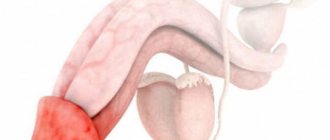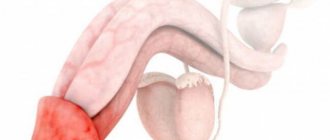Lack or decrease in libido in a woman is a problem associated with a decrease in the desire for intimacy with a sexual partner or masturbation for sexual pleasure.
This is a sexual disorder associated with many factors of the mental, endocrine, genitourinary and other systems. Doctors talk about the problem only if an individual decrease in sexual desire is recorded in a particular patient: it has become lower compared to the previous period and lasts from 4 to 6 months.
It is impossible to diagnose a decrease or absence of libido based on any general signs: the patient may always be overly modest, shy, or, on the contrary, usually radiate sexuality and attraction.
Diagnosis of decreased libido
To identify the causes of sexual dysfunction, gynecologists will conduct a full examination of the patient. First of all, laboratory blood tests for hormones and biochemical components are needed. Be sure to take a general blood test and a urine test to identify inflammatory reactions in the body. Laboratory assistants also conduct microscopy of vaginal smears and scrapings from the vestibule to assess the state of the microflora and determine the presence of pathogenic microorganisms.
The doctor also prescribes instrumental diagnostics:
- Transabdominal ultrasound of the pelvic organs and thyroid gland;
- Transvaginal ultrasound;
- MRI, CT scan of the pituitary gland, hypothalamus;
- Multislice computed tomography of the adrenal glands.
You may need to consult a psychologist and psychotherapist, cardiologist, neurologist and other specialists.
When diagnosing “absence or decreased libido” in women, doctors also take into account the psycho-emotional component. It is important to tell the doctor about possible previous problems: stressful situations at work, constant quarrels with a sexual partner, other nuances that a woman pays strong attention to to the detriment of sexual activity.
The doctor conducts tests, offers to take surveys, fill out various questionnaires, where the patient independently assesses her sexual desire at the moment, compares it with previous periods, and finds possible reasons. Such a subjective opinion helps the andrologist or gynecologist to collect a detailed medical history.
WHY DOES LIBIDO FALL?
The main reasons are divided into two groups: psychological and medical. True, most often they are intertwined, and in order to help the patient, the doctor must first untangle this tangle. For example, after childbirth, some women's pelvic floor muscles weaken, the vagina loses elasticity, stretches, friction during intercourse becomes insufficient, and characteristic sounds may appear. As a result, the woman begins to feel shy, avoid contact, and her libido decreases. In this case, several sessions of intimate rejuvenation can correct the situation. But in general, it is better to solve psychological problems at least with the participation of a specialized specialist, so let's focus on the medical side of the issue.
There are many medical reasons for decreased sexual desire, from simple overwork to serious hormonal problems. Female libido directly depends on the level of testosterone and magnesium: the lower these indicators, the less desire. Why does magnesium decrease? One of the most common reasons is overwork or stress. In this case, along with magnesium, the level of cortisol (the so-called stress hormone) also changes, which deals an additional blow to libido. In addition, magnesium levels may decrease if you abuse alcohol, coffee and fatty foods, if you are on a strict diet, or take antibiotics. By the way, magnesium is one of the most important microelements and affects not only the level of sexual desire, so it would be good to check it at least once a year.
Let's move on to testosterone. Strictly speaking, any change in hormonal levels can lead to a decrease in libido, but it is directly related to the lack of testosterone. Testosterone deficiency can occur if you go on a strict diet, become a vegetarian or raw foodist, if your menu contains too many carbohydrates. The next items on the list are lack or excess of physical activity, obesity, neoplasms in the ovaries, the already well-known stress and alcohol, and, of course, any, even minor, hormonal imbalances.
Don’t forget about the natural cause of a drop in testosterone and other sex hormones – menopause. A decrease in libido in this case is just the beginning. It is often followed by changes in fat metabolism, rapid weight gain, rapid aging of the skin - in a word, age-related changes. Therefore, if you notice a decrease in libido with age and think that this is inevitable, forget it. Firstly, not everyone’s libido decreases with age, and age alone cannot reduce libido in a healthy person: as I already said, it can and should persist into 80 and 90. Secondly, the youngest people , older women who look and feel best are those who are genetically lucky to have high and stable levels of sex hormones even during menopause. Thirdly, today's medicine can easily balance hormonal levels, soften the symptoms of menopause or even delay its onset. This can be done, it is necessary, it is not difficult and not dangerous, but not using modern scientific achievements for the benefit of one’s own body is a real crime. You're not giving up antibiotics, are you? Therefore, contact a competent endocrinologist at the first signs of menopause: I guarantee that you will not regret this decision.
Another common cause of decreased libido is hormonal contraceptives. We talked in detail about why you shouldn’t be afraid of them in the previous article, but still, for some, libido actually drops while taking GC. And here you need to understand several things. Firstly, this decrease is temporary. Secondly, this can often be corrected with a banal course of microelements. Thirdly, there are different drugs, and not all of them affect libido, so it won’t be difficult for a good doctor to choose the right one for you.
Well, as a separate point, I’ll mention the decrease in libido after childbirth: this happens quite often. One of the reasons is an increase in prolactin levels. The timing is very individual, but if attraction has not been restored after a year, it is worth consulting with a specialist.
Treatment of low sexual desire
If the doctor has identified pathologies that affect libido, they begin treatment. Specialists from the field whose problems were discovered during the examination are involved in the therapy program.
Medicines
Drug therapy is based on eliminating the root cause and restoring sexual desire. Anti-inflammatory, painkillers, angioprotectors and antispasmodics may be prescribed to restore blood circulation.
If the cause of the pathology lies in the malfunction of the endocrine system, doctors choose hormonal drugs: tablets, vaginal rings, creams, gels. Sometimes lifelong hormonal therapy is required. In difficult situations, for example, with tumors of the pituitary gland or hyperfunction of the thyroid gland, endocrinologists perform operations.
Often simply replacing oral contraceptives or adjusting their dosage is sufficient. Then libido is restored within 1-2 months.
Psychotherapy
Communication with a psychologist or psychotherapist will help to identify the range of reasons for the decrease in intimate desire, and a course of competent psychotherapy will help to completely eliminate them.
It is important to tell the specialist everything that worries you and answer questions honestly. Sometimes the doctor prescribes medications to help restore the psyche.
Other help
Sexologists recommend establishing a trusting relationship with your sexual partner: perhaps the reasons lie in misunderstanding. It is important to talk about your fears, desires, dissatisfaction. Well-established spiritual intimacy will be a good help in the intimate sphere.
It is also recommended to change the environment and spend more time on foreplay. Scented candles, oils, aphrodisiacs will help you relax, and intimate toys and stimulants will catalyze sexual desire.
It is necessary to reconsider your lifestyle: stop drinking alcohol, tobacco products, eat right and engage in moderate physical activity. A course of vitamin complexes will restore and strengthen women's health.
WHY DOES LIBIDO INCREASE?
I don’t know whether this information will make you happy or sad, but there are no medical pathologies that increase libido. The so-called “uterine rabies” or nymphomania is a mental disorder, and not an endocrine one. As for the phenomenon of “women after 35,” when, as is commonly believed, we reach the peak of sexuality, the explanation is quite simple. By about 30-35 years, a woman’s hormonal levels finally level out and become stable: childbirth often contributes to this. In addition, at this age a woman becomes more stable emotionally. Most often, she already has a career behind her, her views on the world have been formed, she has accepted herself, her body and does not think about how her breasts look during sex or whether cellulite is visible. This means she can simply enjoy the process more. This is the explanation.
As for ways to artificially increase libido (both female and male), I have to disappoint: they do not exist yet. Even Viagra does not increase libido, but only solves problems with potency. It is assumed that if the patient wanted to solve them, then he still has libido. Of course, there are aphrodisiac foods that affect the production of dopamine. These are, for example, oysters, pumpkin, persimmon. But for any noticeable effect, you will have to eat so many of them that after that you will only want to take a Mezim tablet and lie down.
Therefore, if your libido has increased by itself, rejoice. This may mean that your hormonal levels have stabilized, that you have recovered from stress or overwork, or that you have a loved one at your side.
2. Reasons
The causes of hypo- and alibidemia can be divided into two large classes: organic and psychological. In the first case, lack of libido is closely related to a deficiency of the corresponding hormones and neurotransmitters, which occurs in many endocrine-metabolic disorders, chronic fatigue syndrome, vitamin deficiencies, gynecological diseases, oncological processes, etc.
Psychological causes include all kinds of psychotrauma associated with sex (their spectrum is very wide, it extends from early childhood experiences to life-threatening rape in a perverted form), incorrect gender education, the presence of unconscious or repressed deviations, preferences, fantasies (for example, of a homosexual or polygamous nature) , too early or too late, painful or simply unsuccessful initiation of sexual activity, fear of unwanted pregnancy and, finally, problems with partner(s).
The last factor is also extremely diverse: illiteracy, tactlessness, selfishness, annoying experimentation, distortions of drives, differences in “acceptability ranges,” failure to maintain intimate hygiene, early ejaculation, and many others. On the other hand, women with certain characterological characteristics and distorted attitudes often exaggerate or even confabulate such problems, without hesitation shifting all the “blame” onto their partners, while the true reasons may lie in a completely different area.
One way or another, the main “libido killers” really include monotony, predictability, spontaneity of sexual life, fatigue, stressful situations (“no time for sex now”), as well as excessive internal censorship of one or both partners, or a complete lack of censorship and culture sex.
Speaking about the causes, it should be noted that anorgasmia is a frequent consequence of hypolibidemia, but it can also be the root cause: without receiving appropriate normal reinforcement and release, psychosexual tension is gradually reduced - which serves as a kind of protective and adaptive mechanism.
Visit our Gynecology page
4.Treatment
Currently, hypolibidemia can be successfully treated in the vast majority of cases, even if the severity reaches the level of alibidemia. The strategy is naturally determined by the results of a comprehensive survey. When organic causes are identified, the first priority is to treat the underlying disease or, if it is chronic, to stop exacerbations and achieve stable, high-quality remission. In some cases, hormone replacement therapy, an enhanced diet, vitamin therapy, sanatorium treatment, special gymnastics, and auto-training are indicated. It is almost always necessary to normalize the lifestyle and eliminate all controllable (depending on the will of the patient) factors that contribute to “psychological” hypolibidemia, as well as psychocorrective work with a partner. Sometimes a course of special psycho- or sexopathological therapy is prescribed.
In general, prescriptions are exclusively individual in nature and cannot be blindly copied from one case (even the most successfully cured) to another. The best and only universal recommendation here is the urgent advice to consult a specialist. In this regard, it should be noted that the situation in recent years has been gradually changing for the better: with the growth of medical literacy of the population, awareness of healthy and abnormal sexuality, and the availability of specialized care, more and more people are suffering from hypolibidemia, regardless of gender, age and orientation, They prefer not to push the problem deeper, but to solve it using adequate methods.
What to do if libido has decreased?
How to understand all this variety of harmful factors and prescribe adequate treatment? Initially, it is necessary to reliably determine why desire disappears in men or women. And only then think about how to increase sexual desire.
Since the term “desire” is a subjective concept for each patient, until recently it was not easy to diagnose a decrease in libido levels. After all, it happens that a man complains “I don’t feel like it,” but in fact his sexual desire is normal. But there is a syndrome of anxious anticipation of sexual failure and erectile dysfunction. It also happens the other way around, the patient says “I want to, but I can’t,” although in fact it is his libido that suffers.





